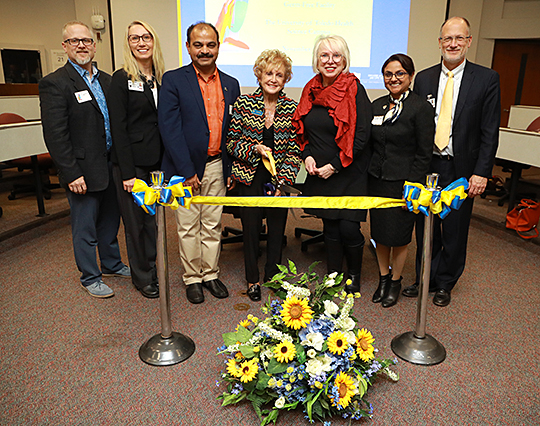The University of Toledo is expanding its microbiome research capabilities with the creation of a new germ-free laboratory that will provide unique opportunities for scientists investigating the link between gut bacteria and chronic conditions such as hypertension.
Researchers in the UToledo College of Medicine and Life Sciences have been at the forefront of innovative research that suggests the particular makeup of our individual gut bacteria has major implications on our health.

Doing the honors to mark the creation of a new germ-free laboratory on Health Science Campus were, from left, Scott Bechaz, associate director of the Department of Laboratory Animal Resources; Dr. Lisa Root, attending veterinarian and director of the Department of Laboratory Animal Resources; Dr. Matam Vijay-Kumar, director of the UToledo Microbiome Consortium; Dee Talmage, chair of Women & Philanthropy; Marja Dooner, chair of the Women & Philanthropy Grants Committee; Dr. Bina Joe, Distinguished University Professor and chair of the Department of Physiology and Pharmacology; and Dr. Christopher Cooper, dean of the College of Medicine and Life Sciences, and executive vice president for clinical affairs.
“We have been working with available models asking as many research questions as we can. We are getting definitive links, but we haven’t yet found definitive answers for mechanisms,” said Dr. Bina Joe, Distinguished University Professor and chair of the Department of Physiology and Pharmacology. “It is our hope this new lab will help provide those answers and open avenues for new therapeutic methods.”
By studying germ-free animal models that completely lack microbiota, Joe and other UToledo researchers will seek to further their understanding of how the colonies of tiny organisms that call our bodies home benefit or harm human health.
The project received $65,000 in grant funding from Women & Philanthropy and matching funds from the College of Medicine and Life Sciences.
While germ-free models are used for a variety of research applications, UToledo’s lab will be one of the only academic sites in the country with germ-free rats, which Joe said more closely mimic human disease states.
Preliminary work on the new Women & Philanthropy Germ-Free Facility for Biomedical Research is underway, with the facility expected to be up and running in 2020 under the guidance of Dr. Matam Vijay-Kumar, director of the UToledo Microbiome Consortium.
“The Women & Philanthropy grant is what is fueling this. We’re extremely grateful for their investment,” Joe said. “I think they see the value in promoting a woman scientist, and they see the value in the technology. We at The University of Toledo want to remain the first to fully understand these links and mechanisms in order to develop new clinical approaches. Rather than taking pills and monitoring your blood pressure every day, you might eventually be monitoring your microbiota and transferring beneficial ones as needed.”
“Women & Philanthropy is proud to be a part of such critical research and cutting-edge technology here at The University of Toledo,” Dee Talmage, chair of Women & Philanthropy, said. “It is a pleasure to support this important medical research, particularly when it has such a national impact.”
Women & Philanthropy has allocated up to $65,000 for 2020 grants to be awarded next spring. Learn more on the Women & Philanthropy website.